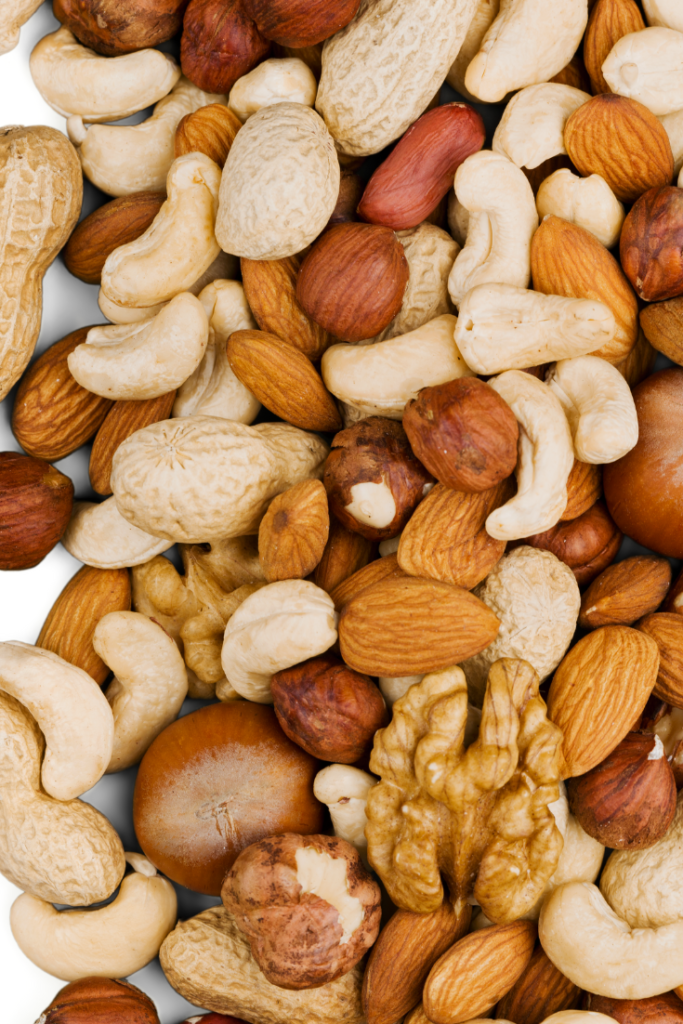Nuts For Brain Health & Cognitive Function
Healthy Fats
- Structural Integrity: The brain is composed of approximately 60% fat, emphasizing the critical role of fats in its structure and function. Healthy fats, such as monounsaturated and polyunsaturated fats, are integral components of cell membranes, ensuring their fluidity and permeability. This structural integrity is essential for efficient signaling between brain cells, supporting optimal cognitive function.
- Omega-3 Fatty Acids: Omega-3 fatty acids, including EPA (eicosapentaenoic acid) and DHA (docosahexaenoic acid), are particularly noteworthy for brain health. DHA, in particular, is highly concentrated in the brain and is crucial for neuronal development and function. These fatty acids play a vital role in synaptic plasticity, the process by which neurons form new connections and adapt to changing stimuli, thereby supporting learning and memory.
- Anti-inflammatory Properties: Chronic inflammation is implicated in various neurological disorders, including Alzheimer’s disease and Parkinson’s disease. Healthy fats possess anti-inflammatory properties, helping to mitigate inflammation in the brain and reduce the risk of neurodegenerative conditions. Omega-3 fatty acids, in particular, exert anti-inflammatory effects, which may contribute to their protective role against cognitive decline.
- Neuroprotection: Healthy fats offer neuroprotective benefits, shielding brain cells from oxidative stress and damage caused by free radicals. Antioxidant-rich fats, such as those found in nuts, seeds, and fatty fish, help neutralize free radicals, thereby preserving the integrity of brain tissue and supporting long-term brain health.
- Cognitive Performance: Numerous studies have demonstrated the positive impact of healthy fats on cognitive performance. Consuming a diet rich in healthy fats is associated with improved memory, attention, and cognitive flexibility. Additionally, research suggests that higher intake of omega-3 fatty acids may reduce the risk of age-related cognitive decline and enhance overall cognitive function across the lifespan.
Antioxidants


- Oxidative Stress Protection: Antioxidants in nuts act as powerful scavengers, neutralizing harmful free radicals and reducing oxidative stress in the body. Oxidative stress is implicated in various chronic diseases, including cardiovascular disease, cancer, and neurodegenerative disorders. By combating oxidative damage, antioxidants help maintain cellular integrity and promote optimal health.
- Heart Health: Several studies have demonstrated a link between nut consumption and improved cardiovascular health, partly attributed to their antioxidant content. Antioxidants in nuts, such as polyphenols and vitamin E, help protect against oxidative damage to blood vessels, reduce inflammation, and improve endothelial function. These effects contribute to lower blood pressure, improved cholesterol levels, and a reduced risk of heart disease.
- Brain Health: Antioxidants play a crucial role in supporting brain health by protecting neurons from oxidative stress and preserving cognitive function. Research suggests that antioxidant-rich diets, including those incorporating nuts, may help reduce the risk of age-related cognitive decline and neurodegenerative diseases, such as Alzheimer’s disease. Additionally, antioxidants in nuts contribute to improved cerebral blood flow and neuroprotective effects, enhancing overall brain health.
- Anti-inflammatory Effects: Chronic inflammation is a hallmark of many chronic diseases, and antioxidants help mitigate inflammation by neutralizing inflammatory mediators and reducing cellular damage. By reducing inflammation, nuts and their antioxidant components help lower the risk of inflammatory conditions and promote overall health and longevity.
- Cancer Prevention: While more research is needed, some studies suggest that antioxidants in nuts may help reduce the risk of certain types of cancer by neutralizing free radicals and inhibiting the growth of cancer cells. Additionally, the fiber and phytochemicals found in nuts further contribute to their protective effects against cancer development.
- Skin Health: Antioxidants in nuts, such as vitamin E and selenium, play a vital role in maintaining skin health by protecting against oxidative damage from UV radiation and environmental pollutants. Including nuts in the diet can help promote youthful-looking skin, reduce the risk of premature aging, and support overall skin health.
High-Fiber Content


- Improved Digestive Health: Nuts are an excellent source of dietary fiber, both soluble and insoluble. Soluble fiber absorbs water in the digestive tract, forming a gel-like substance that helps soften stools and regulate bowel movements. Insoluble fiber adds bulk to stools, promoting regularity and preventing constipation. By including nuts in your diet, you can support optimal digestive function and maintain a healthy gut.
- Blood Sugar Regulation: The fiber found in nuts can help regulate blood sugar levels by slowing down the absorption of carbohydrates. Soluble fiber, in particular, forms a gel in the digestive tract that slows the release of glucose into the bloodstream, preventing rapid spikes in blood sugar levels. This can be particularly beneficial for individuals with diabetes or those at risk of developing the condition.
- Satiety and Weight Management: Fiber-rich foods, like nuts, help promote feelings of fullness and satiety, which can aid in weight management and control. By adding bulk to meals and slowing down the digestion process, fiber helps you feel satisfied with fewer calories, reducing the likelihood of overeating and promoting weight loss or maintenance.
- Heart Health: Fiber has been shown to have numerous benefits for heart health, including lowering cholesterol levels and reducing the risk of cardiovascular disease. Soluble fiber binds to cholesterol in the digestive tract, preventing its absorption and lowering LDL (bad) cholesterol levels. By incorporating nuts into your diet as a source of fiber, you can help improve your heart health and reduce the risk of heart disease.
- Reduced Risk of Chronic Diseases: A diet high in fiber has been associated with a reduced risk of various chronic diseases, including type 2 diabetes, obesity, and certain types of cancer. Fiber helps regulate blood sugar levels, maintain a healthy weight, and support overall metabolic health, reducing the risk of developing these conditions.
Vitamins & Minerals


- Vitamin E: Nuts, such as almonds, hazelnuts, and sunflower seeds, are excellent sources of vitamin E, a powerful antioxidant that plays a crucial role in protecting cells from damage caused by free radicals. Vitamin E also supports immune function, skin health, and neurological function. Including vitamin E-rich nuts in your diet can help maintain overall health and reduce the risk of chronic diseases.
- B vitamins: Nuts contain various B vitamins, including B1 (thiamine), B2 (riboflavin), B3 (niacin), B6 (pyridoxine), and folate. These vitamins play essential roles in energy metabolism, nerve function, and DNA synthesis. B vitamins also contribute to the production of neurotransmitters, which are essential for brain health and cognitive function. Consuming nuts regularly can help ensure adequate intake of B vitamins and support overall health and well-being.
- Minerals: Nuts are rich sources of minerals, including magnesium, potassium, zinc, and selenium. These minerals play important roles in numerous physiological processes, such as muscle function, bone health, immune function, and antioxidant defense. Magnesium, for example, is involved in over 300 enzymatic reactions in the body and is essential for maintaining normal nerve and muscle function. Potassium helps regulate blood pressure and electrolyte balance, while zinc and selenium support immune function and protect against oxidative stress.
- Iron: Some nuts, such as cashews and almonds, are good sources of iron, a mineral that is essential for the production of hemoglobin, the protein in red blood cells that carries oxygen to tissues throughout the body. Iron deficiency can lead to fatigue, weakness, and impaired cognitive function. Including iron-rich nuts in your diet can help prevent iron deficiency and support overall health and vitality.
- Copper: Nuts, particularly cashews and almonds, are also good sources of copper, a trace mineral that plays a key role in energy production, connective tissue formation, and iron metabolism. Copper is also an antioxidant and is involved in the production of collagen and elastin, which are essential for skin health and wound healing. Consuming copper-rich nuts can help support these important physiological functions and promote overall health and well-being.
Protein – Building Blocks


- High-Quality Protein: Nuts are an excellent plant-based source of protein, making them a valuable addition to vegetarian and vegan diets. Protein is essential for muscle repair and growth, as well as the maintenance of bone, skin, and other tissues. Nuts provide a complete or near-complete source of protein, containing all nine essential amino acids that the body cannot produce on its own.
- Amino Acid Profile: Nuts contain a diverse array of amino acids, including both essential and non-essential amino acids. Essential amino acids are those that must be obtained from the diet because the body cannot synthesize them. Nuts provide a balanced combination of amino acids, which are the building blocks of protein and essential for various physiological functions in the body.
- Muscle Maintenance and Repair: Consuming nuts regularly can help support muscle maintenance and repair, particularly for individuals engaged in physical activity or strength training. The protein and amino acids in nuts provide the necessary building blocks for muscle protein synthesis, helping to repair damaged muscle tissue and promote muscle growth and recovery.
- Satiety and Weight Management: Protein is known to be more satiating than carbohydrates or fats, helping to promote feelings of fullness and reduce overall calorie intake. Including nuts in meals or snacks can help increase satiety and prevent overeating, which may aid in weight management and weight loss efforts. Additionally, the combination of protein and healthy fats in nuts provides sustained energy and helps stabilize blood sugar levels.
- Heart Health: Nuts are also beneficial for heart health due to their protein content. Research has shown that incorporating nuts into the diet can help lower LDL (bad) cholesterol levels, improve lipid profiles, and reduce the risk of cardiovascular disease. Protein-rich nuts, such as almonds and walnuts, also contain other heart-healthy nutrients, such as fiber, unsaturated fats, and antioxidants, which further contribute to their cardioprotective effects.
Regulate Blood Sugars


- Low Glycemic Index: Nuts have a low glycemic index (GI), meaning they cause a gradual and steady increase in blood sugar levels compared to high-GI foods. This slow release of glucose into the bloodstream helps prevent spikes in blood sugar levels, which can be particularly beneficial for individuals with diabetes or those at risk of developing the condition.
- High in Fiber: Nuts are rich in dietary fiber, both soluble and insoluble. Fiber plays a key role in regulating blood sugar levels by slowing down the absorption of carbohydrates from the digestive tract. Soluble fiber forms a gel-like substance in the digestive tract, which helps to delay gastric emptying and the absorption of glucose, leading to more stable blood sugar levels over time.
- Healthy Fats: Nuts are a good source of healthy fats, including monounsaturated and polyunsaturated fats. These fats help improve insulin sensitivity and reduce insulin resistance, two key factors in blood sugar regulation. By incorporating nuts into the diet, individuals can help promote better glucose uptake by cells and improve overall glycemic control.
- Protein Content: Nuts also contain protein, which can help slow down the digestion and absorption of carbohydrates, leading to more gradual increases in blood sugar levels after meals. Additionally, protein-rich foods like nuts promote satiety and help control appetite, which can further support blood sugar regulation and weight management.
- Micronutrients: Nuts are packed with essential vitamins and minerals that play important roles in blood sugar regulation. For example, magnesium, found in abundance in nuts like almonds and cashews, helps regulate insulin secretion and glucose metabolism. Chromium, another mineral present in nuts, enhances the action of insulin and improves glucose tolerance.
- Antioxidants: Some nuts, such as walnuts and pecans, are rich in antioxidants, which help reduce oxidative stress and inflammation in the body. Chronic inflammation and oxidative stress can contribute to insulin resistance and impaired glucose metabolism. By consuming antioxidant-rich nuts, individuals can help mitigate these effects and support better blood sugar control.
Nuts Are like Mediation


- Magnesium: Nuts, such as almonds, cashews, and peanuts, are rich in magnesium, a mineral known for its calming effects on the nervous system. Magnesium plays a crucial role in regulating neurotransmitters involved in mood and stress response, including serotonin and gamma-aminobutyric acid (GABA). Adequate magnesium intake from nuts can help promote relaxation and reduce feelings of anxiety and stress.
- Omega-3 Fatty Acids: Certain nuts, like walnuts, are excellent sources of omega-3 fatty acids, which have been linked to improved mood and reduced symptoms of depression and anxiety. Omega-3 fatty acids help regulate neurotransmitter function, reduce inflammation in the brain, and support overall brain health. Including omega-3-rich nuts in the diet may help alleviate stress and promote emotional well-being.
- Protein and Amino Acids: Nuts provide a good source of protein and amino acids, which are essential for the production of neurotransmitters involved in mood regulation. Tryptophan, an amino acid found in nuts, is a precursor to serotonin, a neurotransmitter that promotes feelings of happiness and relaxation. Consuming nuts regularly can help support the production of serotonin and other mood-enhancing neurotransmitters.
- Antioxidants: Nuts are rich in antioxidants, such as vitamin E and polyphenols, which help protect brain cells from oxidative stress caused by chronic stress. Oxidative stress can impair cognitive function and exacerbate symptoms of anxiety and depression. By consuming antioxidant-rich nuts, individuals can help mitigate the effects of stress on the brain and support overall mental well-being.
- Fiber and Slow Digestion: The fiber content of nuts helps slow down digestion and stabilize blood sugar levels, preventing rapid fluctuations in energy levels and mood. Stable blood sugar levels are essential for maintaining an even mood and reducing feelings of irritability and stress. Including nuts as part of a balanced diet can help promote sustained energy levels and emotional stability throughout the day.
- Mindful Eating: Nuts can be a convenient and portable snack that encourages mindful eating practices. Taking the time to savor the taste and texture of nuts can help promote relaxation and reduce stress levels. Additionally, the act of chewing nuts stimulates the release of serotonin in the brain, further enhancing feelings of well-being and contentment.
Satiety & Weight Management

- High in Protein: Nuts are a rich source of plant-based protein, which is known to promote feelings of fullness and satiety. Protein helps regulate appetite hormones, such as ghrelin and leptin, which signal to the brain when you’re hungry or full. Including nuts in meals or snacks can help increase satiety and reduce overall calorie intake, making it easier to manage weight.
- Healthy Fats: Nuts contain heart-healthy monounsaturated and polyunsaturated fats, which contribute to feelings of fullness and satisfaction after eating. Fat takes longer to digest than carbohydrates or protein, helping to prolong feelings of satiety and prevent overeating. The combination of protein and healthy fats in nuts makes them a filling and satisfying snack option that can help curb cravings and prevent snacking on less nutritious foods.
- Fiber Content: Nuts are an excellent source of dietary fiber, both soluble and insoluble. Fiber adds bulk to meals and snacks, which helps promote feelings of fullness and prevents overeating. Soluble fiber forms a gel-like substance in the digestive tract, slowing down the emptying of the stomach and delaying the absorption of nutrients, including carbohydrates. Insoluble fiber adds bulk to stools, promoting regularity and preventing constipation. Including nuts in your diet can help support digestive health and promote long-lasting satiety.
- Low Glycemic Index: Nuts have a low glycemic index (GI), meaning they cause a gradual and steady increase in blood sugar levels compared to high-GI foods. Foods with a lower GI are digested more slowly and provide a sustained release of energy, helping to prevent fluctuations in blood sugar levels and hunger. Choosing nuts as a snack option can help stabilize blood sugar levels and reduce the likelihood of cravings for sugary or high-carbohydrate foods.
- Portion Control: While nuts are nutrient-dense and offer numerous health benefits, it’s important to practice portion control, as they are also calorie-dense. A small serving of nuts (about a handful or 1-2 ounces) can provide valuable nutrients and promote satiety without contributing excess calories to your diet. Including nuts as part of a balanced diet can help support weight management goals while providing essential nutrients and promoting overall health and well-being.
It’s important to note that while nuts offer numerous health benefits, moderation is key due to their calorie density. Consider incorporating a variety of nuts into your diet, such as almonds, walnuts, pistachios, and cashews, and enjoy them as part of a balanced and varied eating plan. As with any dietary changes, it’s advisable to consult with a healthcare professional or a registered dietitian, especially if you have specific health concerns or conditions.

